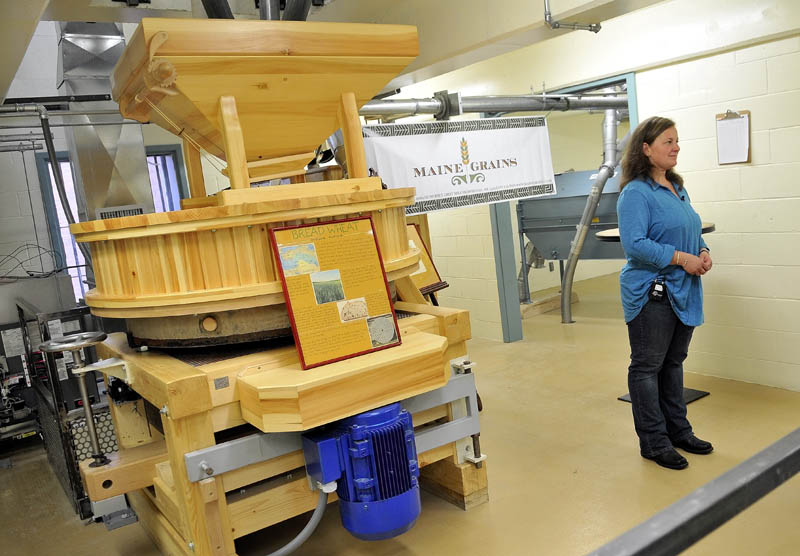SKOWHEGAN — Thirty tons of raw oats rolled into the Somerset Grist Mill from Aroostook County late Tuesday, just in time for Wednesday’s media preview of the mill’s public opening on Saturday.
Three years of planning, construction and community development grants has transformed the 1897 former Somerset County Jail in the middle of downtown into a $1.5 million working mill, said Amber Lambke, co-owner of the mill and Maine Grains, the company that will produce the flour.
“Not only are we excited to revive local grains in Maine, but we are excited to be creating jobs in the community,” Lambke said Wednesday. “We’re excited that this building has found a use and really has become a community center of some of the vibrant activities happening in town and is a huge part of the downtown revitalization of Skowhegan.”
Lambke and her business partner, Michael Scholz, a wheat farmer and baker from Albion, bought the former jail in 2009 for $65,000. About $700,000 of the $1.5 million in investments came from development grants; the rest came from bank loans, private loans and personal equity, Lambke said.
Lambke said the idea for the mill was inspired by the first Kneading Conference in Skowhegan in 2007, which brought together grain growers, bread bakers, wood-fired oven builders and millers for ideas on how to revitalize the regional bread economy.
A grist mill, they said, was the missing link.
“New England was once a major producer of grain, and we wanted to provide that here in Maine,” she said. “There were bakers who were eager for local grains and farmers willing to grow it, but there was no longer an infrastructure to process grain.”
Enter Lambke and the Somerset Grist Mill.
The grist mill location has become a hub for businesses including Lambke’s Maine Grains; the twice-weekly Skowhegan Farmers’ Market; The Pick Up, a multifarm community-supported agriculture project and cafe; Skowhegan Pottery Studio in the jail’s old sally port, where prisoners were booked; Happy Knits, a yarn shop; a commercial kitchen; and The Tech Spot in the former jail’s control room, where high school students instruct older people on computer use.
Twelve jobs have been created at the mill, which is now on the tax rolls for about $3,000 per year. The investment at the mill also has been used by the town to leverage other community redevelopment projects. Sixty jobs were created during renovations by Steve Dionne & Son builders.
Skowhegan Town Manager John Doucette Jr. said it is nice to have the tax dollars rolling in, but the grist mill brings much more to the community and to the region.
“What it brings to the community with the farmers’ market and the other businesses is a positive thing for the whole area — not just Skowhegan, but Somerset County,” Doucette said. “It’s thinking outside the box; nobody would have done something like this. What Amber and her partner have done is come up with something … positive for the community and the state of Maine.”
Lambke said all of the grain to be milled in Skowhegan will come from about 12 Maine farms.
Equipment at the grist mill includes two large mill stones encased in a pine frame, made in Austria; three 15-ton exterior silos; six storage bins; a 1930s Clipper grain cleaner; and a hydraulic grain delivery and bagging system.
Grain producers will back their trucks up to the wooden doors of the mill, where their product will be sucked into one of several holding containers, Lambke said. The grains then are positioned in storage bins in the mill’s attic, above the sorting and milling equipment, where they are gravity-fed into the equipment below.
All of the finished product will end up back on the ground floor of the mill, where it originally entered the building, to be weighed, bagged and shipped out.
Lambke said local consumers can buy the finished flour in 5-pound and 50-pound bags, but most of the product will be sent to wholesale markets across New England. Retail sales will take place Saturdays and Wednesdays at the adjoining Farmers’ Market, through The Pick Up, she said.
Retail sales of milled, organic flour will be available Sept. 21-23 at the mill, after the Common Ground County Fair, where the first sales will take place.
Copy the Story LinkSend questions/comments to the editors.




Success. Please wait for the page to reload. If the page does not reload within 5 seconds, please refresh the page.
Enter your email and password to access comments.
Hi, to comment on stories you must . This profile is in addition to your subscription and website login.
Already have a commenting profile? .
Invalid username/password.
Please check your email to confirm and complete your registration.
Only subscribers are eligible to post comments. Please subscribe or login first for digital access. Here’s why.
Use the form below to reset your password. When you've submitted your account email, we will send an email with a reset code.